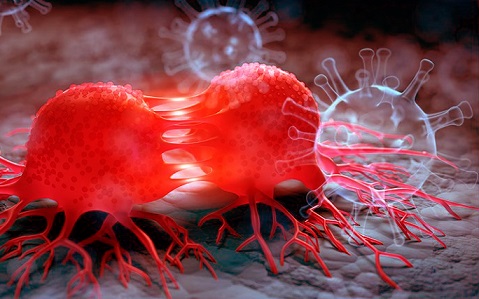Nikhil Prasad Fact checked by:Thailand Medical News Team Dec 01, 2024 1 year, 1 month, 4 days, 47 minutes ago
Medical News: A groundbreaking study by researchers from Xiangya Hospital at Central South University and Yueyang People’s Hospital in China sheds light on how COVID-19 alters the immune microenvironment in cancer patients. The findings highlight the pandemic’s lasting impact on cancer progression and prognosis, opening new doors for tailored treatments and clinical considerations.
 Chinese Study Uncovers Impact of COVID-19 on Cancer Progression
What Was the Study About
Chinese Study Uncovers Impact of COVID-19 on Cancer Progression
What Was the Study About
The research aimed to explore how COVID-19 interacts with cancer at the molecular level. It involved a pan-cancer analysis across 33 cancer types, incorporating data from over 10,230 patients. By developing a unique COVID-19 Immune Signature (COVID-19 ImSig), the scientists quantified the disease's influence on cancer initiation, immune responses, and patient outcomes.
This
Medical News report provides an in-depth look into how the immune system, shaped by COVID-19, can either combat or worsen cancer. The study underscores the dynamic and complex relationship between SARS-CoV-2 and cancer, with findings that could transform clinical oncology.
Key Findings of the Research
The researchers found that COVID-19’s impact on cancer is multifaceted:
-Immune Activation and Suppression
The COVID-19 ImSig was linked with both immune stimulators and inhibitors, such as VTCN1. While it activated pathways related to tumor progression, it also suppressed others, creating a unique immune landscape in each patient. Immune cell infiltration levels varied, with type 2 T-helper cells being notably less active.
-Prognostic Implications
The study revealed that COVID-19 ImSig plays different roles in various cancers. High scores predicted better outcomes in cancers like breast (BRCA), lung adenocarcinoma (LUAD), and skin melanoma (SKCM). Conversely, they signaled poor prognoses in low-grade gliomas (LGG), mesothelioma (MESO), and uveal melanoma (UVM).
-Tumor Microenvironment Analysis
The COVID-19 ImSig was positively associated with tumor-related factors such as intra-tumoral heterogeneity (ITH), tumor mutation burden (TMB), and neoantigen presence. However, the benefits of these associations varied across cancer types. In tumors like LGG and MESO, high scores indicated incomplete immune cycles, resulting in poor outcomes.
Survival Data Insights
Survival data emphasized COVID-19 ImSig’s dual role. For certain cancers, high scores correlated with prolonged survival, while for others, particularly LGG, high scores meant shorter survival times. The published study also cited previous studies that align with these observations, adding credibility to the findings.
Why Do the Effects Vary
The research suggests that immune responses activated by COVID-19 are non-
specific, involving both positive and negative regulatory mechanisms. For cancers like LGG and UVM, low levels of immune markers like TMB and ITH limit the immune system’s ability to target tumor cells. This results in immune escape and tumor progression. On the other hand, for cancers like LUAD, immune activation resembles therapeutic strategies using oncolytic viruses, leading to tumor suppression.
Clinical Implications
This research has far-reaching implications:
-Patient Monitoring
Cancer patients with a history of severe COVID-19 may require additional monitoring to manage potential immune dysregulation.
-Treatment Strategies
The findings prompt consideration of antiviral therapies or immune-modulating treatments for cancer patients who contract COVID-19.
-Personalized Care
Identifying cancers that benefit from immune activation could guide future therapeutic approaches, leveraging the immune activation seen in some cancers.
Conclusions
The study conclusively shows that COVID-19 affects cancer prognosis in diverse ways, underscoring the need for individualized care. For cancers like LGG, where prognosis worsens, additional therapeutic measures may be necessary. For those with better outcomes, the study hints at potential immune mechanisms that could be harnessed for therapy.
Moreover, these findings stress the importance of ongoing research into how viral infections interact with cancer. As the world continues to grapple with COVID-19’s legacy, its ripple effects in oncology demand attention. Clinicians must remain vigilant and adapt treatment protocols to address the dual challenges of cancer and COVID-19.
The study findings were published in the peer-reviewed Journal of Infection.
https://www.sciencedirect.com/science/article/pii/S0163445324002998
For the latest COVID-19 News, keep on logging to Thailand
Medical News.
Read Also:
https://www.thailandmedical.news/news/covid-19-linked-to-relapse-in-blood-cancers
https://www.thailandmedical.news/news/covid-19-worsens-existing-liver-disease-and-could-spur-liver-cancer-development
https://www.thailandmedical.news/news/australian-scientists-warn-of-rising-advanced-breast-cancer-cases-in-the-current-covid-19-era
https://www.thailandmedical.news/news/new-study-findings-show-how-sars-cov-2-impacts-cancer-cells
https://www.thailandmedical.news/news/study-reveals-the-sars-cov-2-spike-protein-interacts-with-over-60,000-host-proteins-and-may-trigger-carcinogenesis
(Refer to TMN Website, there are more than 106 articlew on Cancer and COVID-19)
Follow us on:
https://x.com/ThailandMedicaX
https://bsky.app/profile/thailandmedical.bsky.social
https://gettr.com/user/thailandmedicalnews
https://www.facebook.com/ThailandMedicalNews
